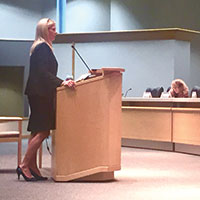 Mayfield bid to rein in FMPA narrowly survives first hearing
Mayfield bid to rein in FMPA narrowly survives first hearing
STORY
TALLAHASSEE – Despite the Florida Municipal Power Agency’s efforts to trash Vero Beach before the Florida House Energy and Utilities Subcommittee Monday, legislators moved forward a bill that could force the electric co-op to better account for the ownership share of its members, including Vero Beach, in the co-op’s assets and liabilities
A heavily watered-down version of the bill introduced by Rep. Debbie Mayfield passed its first legislative hurdle on a squeaker of a vote with Chairman Dane Eagle, a Republican out of Cape Coral, breaking a 5-5 tie by supporting House Bill 579.
The original bill filed by Mayfield – before ever making it to a vote – had been stripped of two major components in order to appease members of the subcommittee.
Originally, House Bill 579 was designed to bring the Florida Municipal Power Association under the regulation of the Florida Public Service Commission. The bill would have also tasked the Office of Public Counsel with keeping a better eye on the FMPA, in the wake of a troublesome audit in 2015 showing a lack of accounting controls, massive losses from risky investments and flagrant spending on top-management benefits and employee perks.
Mayfield presented a summary of the bill she originally filed, and said that after the two regulatory provisions were stripped away, “what this leaves is the transparency.”
She explained that the bill would require the FMPA to provide its members with the fair-market value of each city’s portion of the co-op’s generation assets. That number, for each city, has to this point never been available, making it virtually impossible for a city to s cash out of the co-op.
Rep. Matt Hudson, a Republican who hails from Naples and LaBelle and who is also Speaker Pro Tem of the Florida House, asked Mayfield to identify the problem the bill is aiming to solve.
“The problem we’re trying to solve is the FMPA is an entity we created through legislation many years ago,” she replied, adding that as a quasi-government agency, the FMPA should be required to provide pertinent financial information. “There were some alarming things that the Auditor General found through their finances.
“We felt that it was important that they provide financial information so the taxpayers and the ratepayers know where they stand financially,” Mayfield said.
Committee members grilled Mayfield about why she had agreed to dropping the provisions that would have placed the FMPA under the PSC and the Office of the General Counsel.
“There was too much of a financial impact that some of the members thought their cities were going to have,” Mayfield said, so she was willing to remove the provision to preserve the portion of the bill that called for the disclosure of the financial and fair-market value data to member cities and the public.
The other portion of the bill that survived the horse-trading process was a clause that would require FMPA member cities to send elected officials to serve on the Board of Directors.
Former House Speaker Dean Cannon, now a lobbyist for the FMPA and its sister organization the Florida Municipal Electric Association, said the FMPA and FMEA were opposed to the bill, even in its amended form.
In a few cases, and in particular in Vero Beach, a majority of the ratepayers live outside the city limits. He said Vero has failed to do what it should have done to resolve its issues with its outside ratepayers.
“FMPA is a fully transparent body today,” Cannon said.
“Except for a few cases, and Vero being the poster child for how not to do it,” he said, “municipal power providers function well.”








